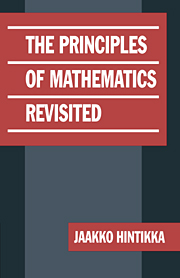Book contents
- Frontmatter
- Contents
- Introduction
- 1 The functions of logic and the problem of truth definition
- 2 The game of logic
- 3 Frege's fallacy foiled: Independence-friendly logic
- 4 The joys of independence: Some uses of IF logic
- 5 The complexities of completeness
- 6 Who's afraid of Alfred Tarski? Truth definitions for IF first-order languages
- 7 The liar belied: Negation in IF logic
- 8 Axiomatic set theory: Fraenkelstein's monster?
- 9 IF logic as a framework for mathematical theorizing
- 10 Constructivism reconstructed
- 11 The epistemology of mathematical objects
- Appendix (by Gabriel Sandu)
- References
- Index of names
- Index of subjects and titles
4 - The joys of independence: Some uses of IF logic
Published online by Cambridge University Press: 15 December 2009
- Frontmatter
- Contents
- Introduction
- 1 The functions of logic and the problem of truth definition
- 2 The game of logic
- 3 Frege's fallacy foiled: Independence-friendly logic
- 4 The joys of independence: Some uses of IF logic
- 5 The complexities of completeness
- 6 Who's afraid of Alfred Tarski? Truth definitions for IF first-order languages
- 7 The liar belied: Negation in IF logic
- 8 Axiomatic set theory: Fraenkelstein's monster?
- 9 IF logic as a framework for mathematical theorizing
- 10 Constructivism reconstructed
- 11 The epistemology of mathematical objects
- Appendix (by Gabriel Sandu)
- References
- Index of names
- Index of subjects and titles
Summary
So far, I have been talking about what IF logic is like. The next question is what such a logic can do. This question admits of a variety of partial answers already at the present stage of the exploration that is being carried out here.
Perhaps the most general key to the usefulness of a recognition of informational independence is the ubiquity of such independence. Many philosophers still seem to think of branching quantifiers – and informational independence in general – as a marginal phenomenon, a logician's curiosity without deeper theoretical interest. In view of such views, it is important to realize that informational independence is in reality a widespread and important feature of the semantics of natural languages. It can be shown to play a crucial role in epistemic logic, in the theory of questions and answers, in the de dicto versus de re distinction, and so forth.
The prevalence of informational independence does not come as a surprise to anyone who thinks game-theoretically about the semantics of natural languages. The leading idea of such a gametheoretical approach is to associate a game rule to each different structural feature and to each lexical item of a natural language. But as soon as that has been done, you have – or, rather, language users have – the option of considering some moves as being made on the basis of nonmaximal information sets, no matter what the structural feature or lexical item in question is.
Information
- Type
- Chapter
- Information
- The Principles of Mathematics Revisited , pp. 72 - 87Publisher: Cambridge University PressPrint publication year: 1996
